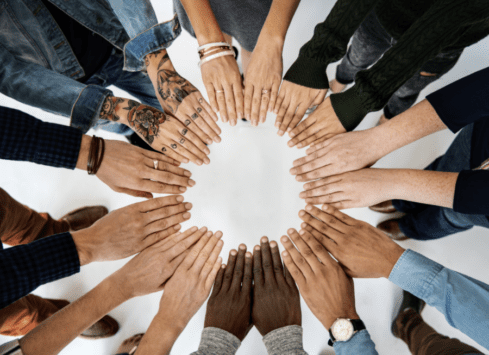By: Pui Wong, Compass One Healthcare Communications & Social Media Intern
Ignite Inclusion: Achenyo Omale’s Story
From Nigeria to America
When Achenyo Omale first came to the U.S., a few things surprised her: the way students walked into classes in their pajamas with their coffee, how casual “business casual” really was and how much people valued their personal bubble. Now having been with Morrison for more than four years, Achenyo shares about the cultural differences between Nigeria and America in the workplace and her experience at Morrison.
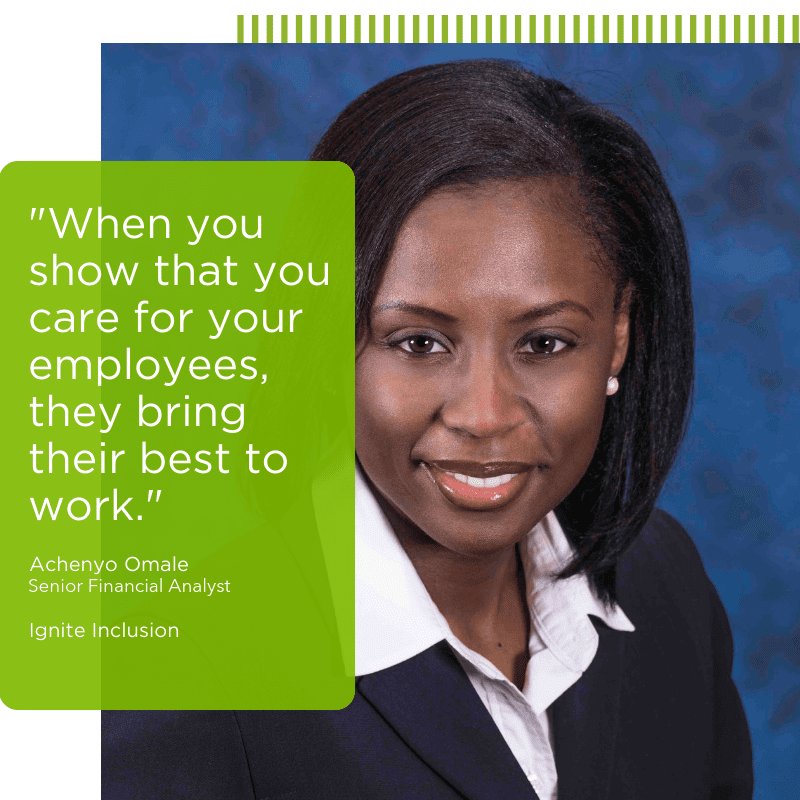
Born and raised in Nigeria, Achenyo has always had a flair for numbers and naturally studied civil engineering in college. Yet upon graduation, when she realized that she might be sentenced to a life of wearing jeans, hard hats and pencils in her hair, Achenyo swiftly decided to pursue a career in finance instead to crunch numbers in a different field. After marrying her husband, Achenyo moved to the U.S. and soon obtained a master’s degree in finance from the University of Illinois. Achenyo took up her first job in the U.S. with Morrison—and is now a Senior Financial Analyst.
Cultural Shocks in the Workplace
After 11 years in the U.S., Achenyo is now well adjusted to America and its way of life, though it did take her a few years and much effort initially due to the stark cultural differences between her home country and America. The workplace is where Achenyo particularly experiences some of these differences. For starters, the workplace culture in Nigeria is much more formal—employees go to work formally dressed. Women can’t wear bright colors like red and yellow, and men have to wear suit and tie. Employees address anyone older than themselves as “mister” or “missus.”
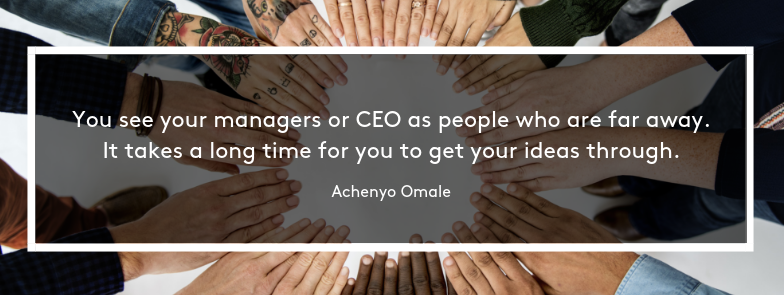
After all, a country’s workplace culture reflects its own culture. For Achenyo, a big part of the Nigerian culture is built upon its hierarchical structure, which regards the elders’ opinions as superior and discourages younger people from participating in conversations with adults. In the workplace, this translates to a power distance between junior and senior employees, which bars the former from voicing their ideas. “You see your managers or CEO as people who are far away,” Achenyo says. “It takes a long time for you to get your ideas through and push your work all the way up to them.”
That’s why Achenyo was shocked when her coworkers introduced Morrison CEO Tim Pierce as “Tim” at a meeting during her first week on the job.
Achenyo explains that back home, CEOs are never referred to by their first names and won’t sit in the same section as entry-level employees, let alone talk to them. In that respect, Achenyo describes Morrison as a flatter organization because people stand relatively on a level ground regardless of their title. “It’s more informal so I don’t feel like I have to jump hoops to contribute. I feel more comfortable to say what’s on my mind,” she says.
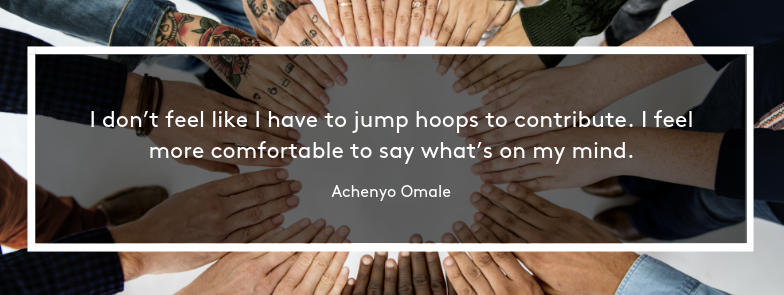
With Changes Come New Challenges
Despite a more open environment, Achenyo still found it challenging to voice her opinion at first due to her background. In America, we often hear the saying that “there is no such thing as a stupid question.” This belief is reflected in the American workplace, which generally expects employees to ask questions, contribute and actively engage with others. In contrast, Achenyo explains people in Nigeria are taught to frown upon “stupid” questions early on in school: unless their question is brilliant, they should remain silent.
When Achenyo first arrived, she found it difficult to contribute at meetings and stayed relatively quiet. Luckily, her boss understood the cultural differences and encouraged her. “She told me she knew that I might want to be respectful, but I could speak up. Since then I’ve come a long way and I’m finding my voice,” she says.
Great Teammates Make It Easier
Having welcoming coworkers helps. Achenyo recalls seeing the muscles in her coworkers’ faces pulling as they tried to pronounce her name right. “They really wanted to connect with me. Just trying to pronounce my name well, that went a long way for me,” Achenyo says.
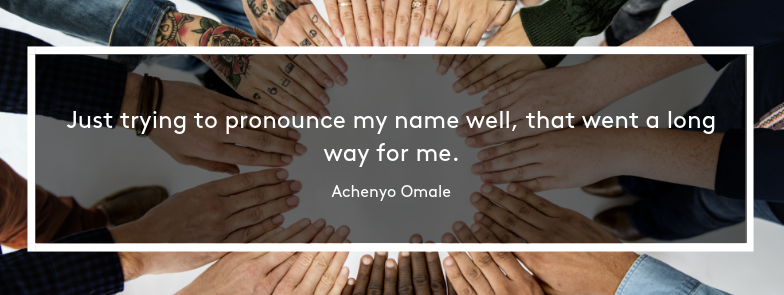
Coworkers can help their teammates who are new to the United States adjust by being patient and gracious when responding to their questions, Achenyo says. Her personal experience was great because she had kind coworkers and a boss whom she could ask approach with questions about American culture, the appropriateness of her actions or words and ways to adjust to her new work setting. “If I am going to spend an average of 40 hours a week with these people, then work will not be such a chore.”
A Diverse and Inclusive Workplace=Happy Employees
Achenyo believes diversity and inclusion in the workplace are important because they help everyone feel comfortable about bringing his or her contribution to the table without fear of rejection. When employees feel included, they feel valued and develop a sense of belonging to the organization. “When you show that you care for your employees, they bring their best to work,” she says.
If Achenyo has ever felt excluded, it was not intentional. A few years ago, a group of her coworkers were discussing a football game from the night before. Achenyo’s mind did a few backflips trying to follow the conversation because the strange game they were describing sounded nothing like the “football” she knew—soccer. As her coworkers passionately gave their renditions of the game, Achenyo was lost but held back from asking questions for fear of interrupting the flow. She later called someone aside to clarify and since then, she has a designated “football professor” who has been a great help bringing her up to speed on America’s favorite sport.
The Learning Journey Continues
The thing that Achenyo likes the most about working at Morrison is the way her team provides her opportunities to grow. “They see where my strengths are and try to give me projects that will enhance them and that are still in line with helping the company grow. You’re contributing to a great cause and at the same time they’re thinking about your development.”
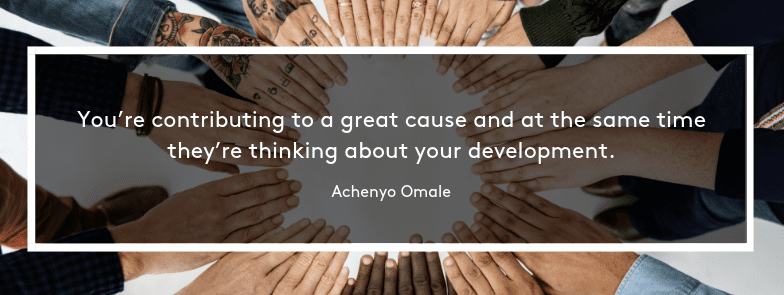
The support from Achenyo’s teammates has paved the way for her to switch to another role in operations. She will miss working with her current team, but not that much—because they will likely run into one another three times a day on the same floor.
Looking for more stories of inclusion? Check out these latest ones:
- Ignite Inclusion: Holly Blunkall’s Story
- Ignite Inclusion: Thecla McPhee’s Story
- Ignite Inclusion: Ali Rosario-Guerrero’s Story
- Ignite Inclusion: Sahina Dizon’s Story
- Ignite Inclusion: Amanda Corrigan’s Story
Join the Morrison Healthcare Family

Achenyo Omale chose Compass One Healthcare and Morrison because of the opportunities she has to touch the lives of patients and staff. Morrison is a proud part of Compass One Healthcare and Compass Group USA. If you’re interested in a career in healthcare, be sure to check out team member or management opportunities to join the Morrison family through Compass Group Careers.
